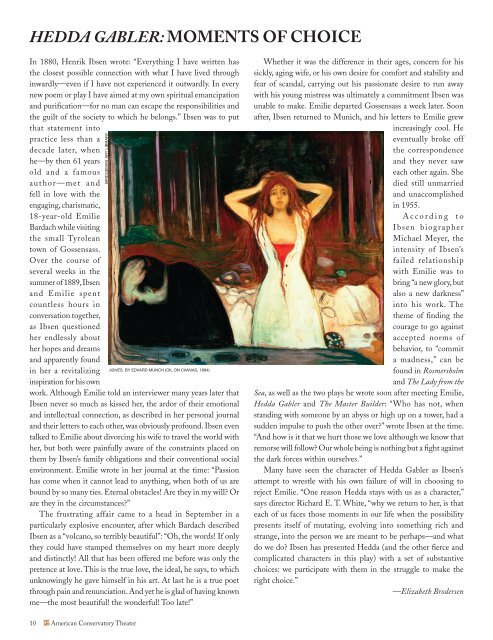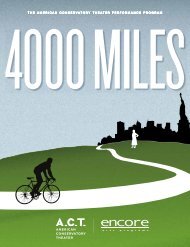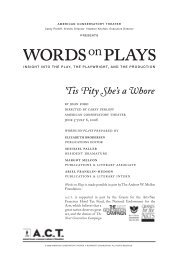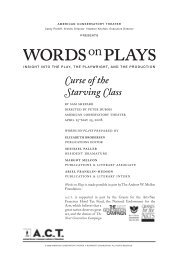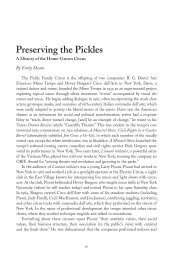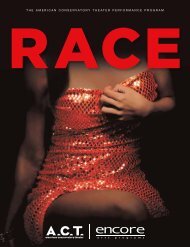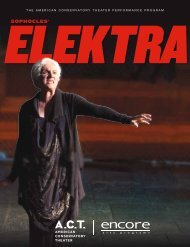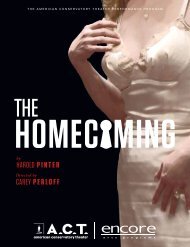Hedda Gabler - American Conservatory Theater
Hedda Gabler - American Conservatory Theater
Hedda Gabler - American Conservatory Theater
Create successful ePaper yourself
Turn your PDF publications into a flip-book with our unique Google optimized e-Paper software.
HEDDA GABLER: MOMENTS OF CHOICE<br />
In 1880, Henrik Ibsen wrote: “Everything I have written has<br />
the closest possible connection with what I have lived through<br />
inwardly—even if I have not experienced it outwardly. In every<br />
new poem or play I have aimed at my own spiritual emancipation<br />
and purifi cation—for no man can escape the responsibilities and<br />
the guilt of the society to which he belongs.” Ibsen was to put<br />
that statement into<br />
practice less than a<br />
decade later, when<br />
he—by then 61 years<br />
old and a famous<br />
author—met and<br />
fell in love with the<br />
engaging, charismatic,<br />
18-year-old Emilie<br />
Bardach while visiting<br />
the small Tyrolean<br />
town of Gossensass.<br />
Over the course of<br />
several weeks in the<br />
summer of 1889, Ibsen<br />
and Emilie spent<br />
countless hours in<br />
conversation together,<br />
as Ibsen questioned<br />
her endlessly about<br />
her hopes and dreams<br />
and apparently found<br />
in her a revitalizing ASHES, BY EDVARD MUNCH (OIL ON CANVAS, 1894)<br />
inspiration for his own<br />
work. Although Emilie told an interviewer many years later that<br />
Ibsen never so much as kissed her, the ardor of their emotional<br />
and intellectual connection, as described in her personal journal<br />
and their letters to each other, was obviously profound. Ibsen even<br />
talked to Emilie about divorcing his wife to travel the world with<br />
her, but both were painfully aware of the constraints placed on<br />
them by Ibsen’s family obligations and their conventional social<br />
environment. Emilie wrote in her journal at the time: “Passion<br />
has come when it cannot lead to anything, when both of us are<br />
bound by so many ties. Eternal obstacles! Are they in my will? Or<br />
are they in the circumstances?”<br />
The frustrating affair came to a head in September in a<br />
particularly explosive encounter, after which Bardach described<br />
Ibsen as a “volcano, so terribly beautiful”: “Oh, the words! If only<br />
they could have stamped themselves on my heart more deeply<br />
and distinctly! All that has been offered me before was only the<br />
pretence at love. This is the true love, the ideal, he says, to which<br />
unknowingly he gave himself in his art. At last he is a true poet<br />
through pain and renunciation. And yet he is glad of having known<br />
me—the most beautiful! the wonderful! Too late!”<br />
BRIDGEMAN ART LIBRARY<br />
10 <strong>American</strong> <strong>Conservatory</strong> <strong>Theater</strong><br />
Whether it was the difference in their ages, concern for his<br />
sickly, aging wife, or his own desire for comfort and stability and<br />
fear of scandal, carrying out his passionate desire to run away<br />
with his young mistress was ultimately a commitment Ibsen was<br />
unable to make. Emilie departed Gossensass a week later. Soon<br />
after, Ibsen returned to Munich, and his letters to Emilie grew<br />
increasingly cool. He<br />
eventually broke off<br />
the correspondence<br />
and they never saw<br />
each other again. She<br />
died still unmarried<br />
and unaccomplished<br />
in 1955.<br />
According to<br />
Ibsen biographer<br />
Michael Meyer, the<br />
intensity of Ibsen’s<br />
failed relationship<br />
with Emilie was to<br />
bring “a new glory, but<br />
also a new darkness”<br />
into his work. The<br />
theme of fi nding the<br />
courage to go against<br />
accepted norms of<br />
behavior, to “commit<br />
a madness,” can be<br />
found in Rosmersholm<br />
and The Lady from the<br />
Sea, as well as the two plays he wrote soon after meeting Emilie,<br />
<strong>Hedda</strong> <strong>Gabler</strong> and The Master Builder: “Who has not, when<br />
standing with someone by an abyss or high up on a tower, had a<br />
sudden impulse to push the other over?” wrote Ibsen at the time.<br />
“And how is it that we hurt those we love although we know that<br />
remorse will follow? Our whole being is nothing but a fi ght against<br />
the dark forces within ourselves.”<br />
Many have seen the character of <strong>Hedda</strong> <strong>Gabler</strong> as Ibsen’s<br />
attempt to wrestle with his own failure of will in choosing to<br />
reject Emilie. “One reason <strong>Hedda</strong> stays with us as a character,”<br />
says director Richard E. T. White, “why we return to her, is that<br />
each of us faces those moments in our life when the possibility<br />
presents itself of mutating, evolving into something rich and<br />
strange, into the person we are meant to be perhaps—and what<br />
do we do? Ibsen has presented <strong>Hedda</strong> (and the other fi erce and<br />
complicated characters in this play) with a set of substantive<br />
choices: we participate with them in the struggle to make the<br />
right choice.”<br />
—Elizabeth Brodersen


